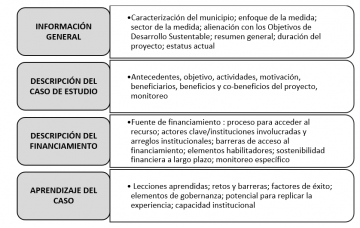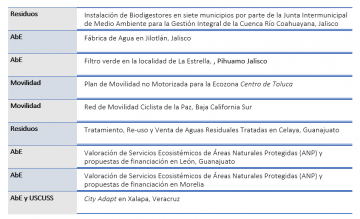VICLIM’s contributions for the financing of climate actions at subnational level
Prepared by: Deutsche Gesellschaft für Internationale Zusammenarbeit (GIZ) GmbH
Vertically Integrated Climate Policies (VICLIM) The project is part of the International Climate Initiative (IKI) of the Federal Ministry for Environment, Nature Conservation, and Nuclear Safety (BMU).
For almost three years the VICLIM project promoted local climate policies and actions aligned with the national goals. Part of this work focused on capacity building and knowledge for accessing to local climate finance.
Background
Among the objectives of the Global Vertically Integrated Climate Policies Program (VICLIM) is the institutional strengthening and the development of instruments and mechanisms for vertical climate integration. The local implementation of climate policies necessarily entails the financing of new projects with a focus on climate change and, therefore, the access and management of additional resources. Within these objectives, VICLIM developed actions in the field of climate financing at the subnational level.
As antecedent, the results of the Report on the Regional Workshops with the States and their contribution to the 2017-2018 Nationally Determined Contribution (NDC) were taken as reference. It, highlights the broad interest of subnational levels on mechanisms, success cases, and capacity building around climate financing , due to the scarce public resources and the lack of technical personnel dedicated to the development of proposals and search for financing at the local level.
The main contributions of VICLIM to these demands are presented below, in order to generate useful information and strengthen governance and capacities regarding local climate financing.
Jalisco and its municipalities: Strengthening capacities to manage climate finance
One of the key partners in this topic was the state of Jalisco, through the Secretariat of Environment and Territorial Development (SEMADET). In August 2017, VICLIM supported a workshop on climate financing for the Inter-municipal Environment Boards (JIMA) of the state of Jalisco. This workshop presented the work done by GIZ in conjunction with the Jalisco SEMADET for the development of indicators that facilitate the process of prioritazing measures from its Regional Climate Action Programs (RCAPs) in the process of finding sources of climate financing. In addition, the common barriers and opportunities were presented among the JIMAs to access financing, among which the lack of technical capacities in project preparation, identification of funding sources, and financial instruments and mechanisms were highlighted.
Considering the results of the workshop, in 2019, VICLIM supported the development of a technical document to provide training to the JIMAs on how to prepare project proposals on climate change adaptation and mitigation measures. The document provides information on how to define adaptation or mitigation objectives and explain their co-benefits, activity development, , definition of different types of indicators and how to develop them for different projects, among others. These trainings will be given by late 2019 or early 2020, in collaboration with the GIZ program of the Mexican-German Climate Change Alliance.
VICLIM also supported the development of a general analysis of fiscal and market instruments for the state of Jalisco. The objective of this analysis was to identify areas of opportunity to capitalize the Jalisco State Environmental Protection Fund (FEPAJ), reduce greenhouse gas emissions (GHG) and increase its carbon sinkholes. The results of the project will be integrated into the internal planning of SEMADET.
Contact information: Arturo Javier Palero Castro, MSc, General Coordinator of Transversal Management to Address Climate Change, Ministry of Environment and Territorial Development (SEMADET). e-mail: arturo.palero@jalisco.gob.mx.
Integrating social and environmental benefits into decision making
Additionally, in collaboration with the “Ecosystem-Based Adaptation to Climate Change Program with the Private Sector” (ADAPTUR) of GIZ, three theoretical and practical workshops were held on a methodology for social cost-benefit analysis of climate change measures were carried out. These workshops covered the background of the CBA and modeling exercises of public investment environmental projects using the ACB computer tool. Together, this knowledge will allow public servants to give recommendations on the convenience of carrying out those projects and report on the costs and benefits they imply for society and the ecosystems. For more information about these workshops and the methodology click here.
Contact information: Ana Lorena Gudiño Valdez, ADAPTUR Advisor – Adaptation to Climate Change (EbA) with the Tourism Sector, GIZ. e-mail: lorena.gudino@giz.de
Identification of enabling conditions for local climate financing
In collaboration with the Secretariat of Environment and Natural Resources (SEMARNAT), success stories at the municipal level on climate finance were identified through desk research and interviews. This case series, details the projects, processes followed, type of financing obtained, enabling conditions, and success factors that made access to resources possible. With the purpose of allowing other municipalities to enable their local contexts and replicate success factors that allow them to increase their chances of accessing resources. The dimensions analyzed in each study were the following:

Till now nine case studies have been developed on a variety of topics such as alternative mobility, ecosystem-based adaptation (EbA) and waste.

Although the number of cases is still small, as part of research learning, it is possible to identify some common elements among projects that have facilitated access to resources for climate action:
- Developing climate policies/sustainable development at the municipal level and linking them with the rest local policies allows labeling resources and gives municipalities an advantage to access international technical cooperation opportunities.
- Active participation of citizens at each stage of the projects. In some cases, the demands and pressures that citizens exerted on local governments prompted the search for solutions to access resources and implement projects.
- Evaluate financial flows to which the municipalities have access and identify the possibilities to increase collection.
- Concurrence of internal and external resources between institutions or between municipalities (regional actions).
- Leadership of local institutions/organizations and interest in the subject.
- Coordination with other actors/institutions and implementation of local governance models that allow an appropriation of projects by various actors.
Contact information: José Alfredo Vargas Gómez, Director of Regional Integration, Secretariat of Environment and Natural Resources, SEMARNAT. e-mail: jose.vargas[at]semarnat.gob.mx.
Exchange of experiences between GIZ projects in Latin America
VICLIM collaborated with the Working Group on Climate Financing for Public Sector Infrastructure of the Environmental Management and Rural Development Sector Network, Latin America and the Caribbean (GADeR-ALC), in a series of online weekly (webinars) that have aimed at publicizing the experiences, advances and tools developed by GIZ in the issue of climate finance in Latin America.
The first webinar was held on June 26 of this year, where VICLIM presented proposals for activities on the subject at the municipal level, including the results of a survey answered by 23 municipalities, mainly from Jalisco at the end of 2018. It highlighted the need for municipalities to understand mechanisms for access to climate finance sources, even for those with greater progress in this area.
The second Webinar took place on July 24 where VICLIM Mexico and Costa Rica presented case studies at the municipal and cantonal level and a study conducted in Costa Rica on the sources of climate finance available in that country. The last webinar was broadcast on September 25, in which VICLIM presented the results of climate finance research at the municipal level in Mexico, which was conducted through 9 case studies on various topics such as ecosystem-based adaptation, waste management and mobility.
In conclusion, it is reiterated that both the strengthening of capacities at the subnational level and the opening of channels and spaces to share experiences and knowledge, are a key part in supporting municipalities in the development and implementation of measures to combat climate change.
